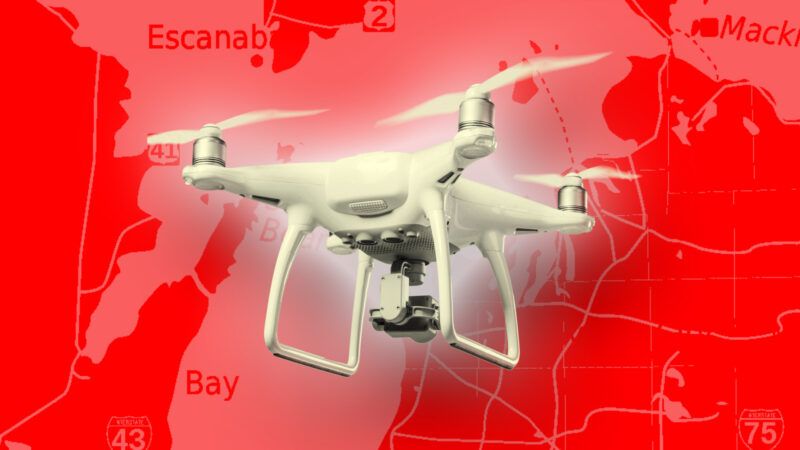Should Governments Need a Warrant To Spy on You With a Drone?
The Michigan Supreme Court will hear opening arguments today in a case that could decide whether the practice is allowed.

A Michigan township sued a local family over a minor zoning violation, but the case could determine whether governments can spy on citizens without warrants. Today, the Michigan Supreme Court is set to hear oral arguments on the case.
Todd and Heather Maxon live in Long Lake Township, on five acres of land with two garages. Todd likes to work on cars, so he keeps some on the property. In 2008, the township sued, accusing them of storing "junk," a zoning violation. In exchange for dropping the charges, the couple agreed not to expand their collection. Neighbors later complained that the Maxons had indeed acquired more cars, but the collection was not visible from the road.
Instead of getting a warrant—or, since nothing was visible from the road, dropping the issue altogether—the township hired a private drone company to fly over the property and take pictures several times between 2010 and 2018. Citing the pictures, the township sued the Maxons for violating the agreement.
The Maxons argued that since the township never sought a warrant, the pictures violated their Fourth Amendment rights. While the Michigan Court of Appeals agreed, the state Supreme Court remanded the case back and asked the appeals court to determine "whether the exclusionary rule applies to this dispute." Under the exclusionary rule, evidence obtained illegally cannot be used at trial.
This time, the court of appeals sided with the township. It agreed that the search was a violation of the Maxons' Fourth Amendment rights but decided that it didn't matter since the case was civil and not criminal. "The exclusionary rule was not intended to operate in this arena, and serves no valuable function," Chief Judge Elizabeth Gleicher wrote, adding, "The exclusionary rule is intended to deter police misconduct, not that of lower-level bureaucrats who have little or no training in the Fourth Amendment."
Gleicher contended that the Maxons could sue the township in civil court for the Fourth Amendment violation but that the evidence should remain free to use against them at trial, as "the social cost of excluding evidence in a case such as this would be substantial…as a public nuisance would potentially remain unabated."
Today, the Michigan Supreme Court will hear oral arguments in Long Lake Township v. Maxon. The court has the chance to decide whether a municipal government can circumvent constitutional protections by farming out the task to a private company.
Oddly, the case is not so straightforward as deciding whether or not warrantless drone surveillance is constitutional; in fact, the appeals court ruled explicitly that it was not. But it also said that excluding any evidence gathered would be inappropriate, so the state Supreme Court can functionally determine whether local governments can do this and get away with it.
Multiple civil liberty advocacy organizations have submitted amicus briefs on behalf of the Maxons. The American Civil Liberties Union (ACLU), the ACLU of Michigan, and the Mackinac Center for Public Policy, a free market think tank based in Michigan, jointly filed a brief in September. The organizations argued that "if the Township gets its way, it will not only profit from its privacy violations, but open the door to other local governments deploying cheap, pervasive, flying surveillance devices to surveil private property for the smallest of civil infractions."
"The exclusionary remedy—whether in criminal or civil enforcement cases like this one—is, in practice, the only reliable incentive modern officials have to take care that Fourth Amendment rights are respected," argued the Institute for Justice, a nonprofit public-interest law firm, in its own brief. "Without consequences for arbitrary invasions into those rights, no one can be secure in their person, house, papers, or effects."
The Cato Institute called the township's search "manifestly unreasonable" as it was "conducted without judicial supervision and with no justification for failing to procure a warrant other than mere convenience."
The Electronic Frontier Foundation (EFF) acknowledges that while existing case law may be on the township's side, the "characteristics" of drones are worth revisiting judicial precedent. In 1986's California v. Ciraolo, for example, the U.S. Supreme Court determined that the Fourth Amendment did not require police to obtain a warrant "in order to observe what is visible to the naked eye."
But Ciraolo involved government agents flying a plane over a house 1,000 feet in the air. While the Court determined that this did not constitute a search, the EFF noted, "it recognized the possibility of 'future "electronic" developments [that] could stealthily intrude upon an individual's privacy' in the same context." The EFF argues that "the seismic technological shifts" in the drone market "necessitate a fresh evaluation of the modern aerial surveillance technology used in this case."


Show Comments (37)